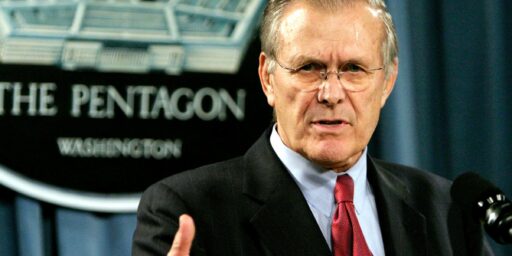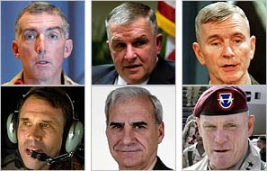Dysfunctional Pentagon?
Bob Novak reports that Rumsfeld has few supporters outside the Bush inner circle.
Rumsfeld is a man of extraordinary talents. When I first covered him almost 40 years ago, he was a House member from Chicago’s North Shore whose future seemed limitless. But he alienated the party’s Old Guard leadership, the reason he left Congress in 1969 to head the Nixon administration’s poverty program.
The Rumsfeld style was apparent when he was still in his thirties and President Richard Nixon named him ambassador to NATO. On his first day in Brussels, he publicly humiliated a young briefing officer with a barrage of questions he was not prepared to answer. It was a management technique Rumsfeld perfected in high federal office and as a successful corporate CEO.
In 2001, a few months after Rumsfeld was brought back for a second hitch at the Pentagon, an old friend of his gave me a disturbing report. A former senior government official who was by then a defense industry consultant, he told me Rumsfeld was a disaster waiting to happen. Rumsfeld, insulated by his inner circle, was at war with the uniformed military, the civilian bureaucracy and both houses of Congress.
This same former official told me last week that the Iraqi prisoners fiasco was the inevitable outgrowth of Rumsfeld’s management style. “If it had not happened with this,” he told me, “there would have been a different disaster.” The “kill the messenger” syndrome, other Pentagon sources say, clogs up avenues of information.
To well-informed outsiders, Rumsfeld’s fate seems assured. Stratfor, the private intelligence service, reported last week: “The amazing thing is not that the White House is preparing Rumsfeld for hanging but that it has taken so long.” The report added that Rumsfeld “consistently managed to get the strategic and organizational questions wrong.” That harsh view is widely shared inside the Pentagon.
I may be in the minority on this one but think a Rumsfeld was absolutely vital for reshaping the armed forces. The fact that he doesn’t need to be liked enabled him to make changes in the defense bureacracy that have been necessary since George Marshall called for them in 1943. He succeeded where presidents, blue ribbon commissions, and others have failed for decades. He hasn’t gone far enough in my view–the transformation has streamlined the warfighting force but hasn’t bolstered the stabilization operations capability nearly enough–but it has been amazing in its scope.





That’s what unnerves so many people about the Bush team. They do what they think needs to be done, without worrying about popularity for the most part. Very unsettling to the finger-always-in-the-wind crowd…
I’m a big Rumsfeld fan – very few folks have had the history, leadership and balls to force the brass away from the Cold War mindset into the light fighter mindset. Rumsfeld does not have to be liked – that is not his job. Many people are blowing off about how he’s being set up for the outting by the Bush Admin – I’m not buying it. He’s far too critical to the Bush Team.
Has Rumsfeld really transformed the Pentagon, or just cut some unneeded weapons here and there? That is, if after he’s gone it’s back to business as usual, then he really won’t have effected long-term change.
If you just heard Bush it does not sound like Rummy is going anywhere.
He just finished speaking and he called Rummy a “Great SECDEF”
And the names of the people who provided Novak with the information that he used to reach his conclusions were…?
In the Washington Post, it usually seems to be cadres from the “old big immobile Cold War Army” mafia that get mined most often for anti-Rumsfeld quotes.
Always Army people on the anti-Rummy quotes.
This stuff is mainly a recycle from the pre 9/11 Rumsfeld is going to be the first cabinet official to fall days.
Novak asserts that Rumsfeld caused the problems at Abu Ghraib because he asks tough questions at briefings.
James,
I hate to sort of agree with you. The military has been changing for years before Rumsfeld arrived. The big change occured in 80s when (I wish I could remember the law’s name) when it became a requirement for the services to play with each other: the creation of the Joint Task Force. Of course the 90s created increasingly powerful networked computers. Rumsfeld genius is that he took these disparte threads and is attempting to force the Pentagon to look at its own assumptions. It seems to be working: the military is far more agile then it used to be….going from a light SF heavy war in 2001 to a more conventional war in 2003 and now a protracted insurgency.
Jim,
You’re thinking of Goldwater-Nichols (1986). It took a long time for it to actually manifest itself, though. The various JCS reports, bottom-up review, QDRs, etc. pre-Rummy were all the same warmed over stuff. Granted, there were some innovations in the interservice relationship over time but there was a lot of resistance, too.
Moe says, “And the names of the people who provided Novak with the information that he used to reach his conclusions were…?”
Probably Eric Shinseki. He and his bunch were just about thrown out by Rummy and Gen. Schoomaker.
Which is why I am counted along side James on this issue. While there have been plenty of mistakes made, on the whole, Rumsfeld is a great SecDef…and I still want to see him judo chop a few Congressmen (those hand and arm gestures are classic).